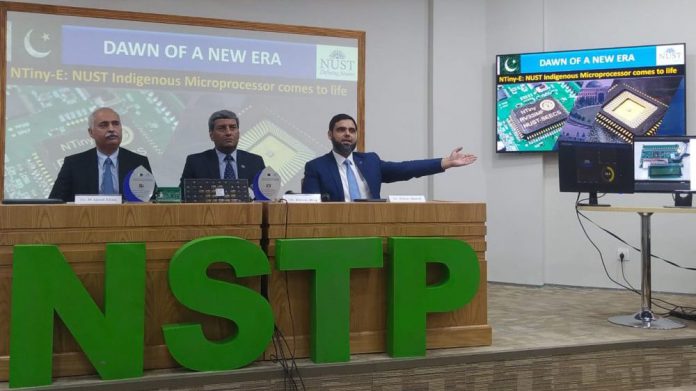NUST university develops Pakistan’s first Self-Esteem Microprocessor. Semiconductor chips are the heart of all electronic devices and consumer goods. However, global semiconductor sales reached $ 556 billion by 2021, but Pakistan has not been able to benefit from this lucrative market. The National University of Sciences and Technology (NUST), in line with its vision of applied research and innovation, has embarked on a journey to make Pakistan dependent on this sophisticated technology.

Interior Design:
The event marks a significant national milestone for the semiconductor landscape and puts Pakistan another step forward to realizing the Quaid vision of Self-confidence. The embedded microprocessor chip was designed by a team of researchers from the NUST School of Electrical Engineering and Computer Science (SEECS). Researchers at NUST have completed a comprehensive test of the original native microprocessor, NTiny-E. A unique feature of the project is its internal design, entirely in contrast to the common practice of using core-source cores from other sources or international collaborations. This makes NTiny-E a truly home product that gives the team full power design and control over all aspects of the chip.
Construction of TSMC:
NUST has selected the world’s largest and leading commercial founder, Taiwan Semiconductor Manufacturing Company (TSMC), for chip production using a 65nm process node. Moreover, this demonstrates the ability of researchers to design chips that comply with international industrial design and manufacturing standards. The NUST team not only developed the chip itself but also developed the complete ecosystem needed to test the chip and its inclusion in final products. The printed circuit board for chip testing and prototyping for end-to-end systems is also custom-built with software-related development tools.
Target market:
The target market for NTiny embedded systems, IoT devices, consumer electronics products, etc. Moreover, this will enable researchers and developers of industrial products to design and manufacture products based on NTiny-E. The home environment of the product alleviates concerns related to online security and technology rejection. NUST also develops human resources that are competent and marketable for the semiconductor market to address the huge shortage of its undergraduate and post-graduate programs. In the wake of the global need for semiconductor chips and export restrictions, NUST researchers’ contributions will help reduce dependence on international purchases over time.
Design Team:
The NTiny design and development team was led by Dr. Rehan Ahmed and other group members, including Mr. Shaheer Sajid, Mr. Qazi Shahid Ullah, Mr. Abdul Moeed, and Mr. Syed Talha Imam. Dr. Rehan has more than 14 years of design experience in the field and has worked for international companies, including SIEMENS, Microsoft Research, and Keysight.
Read More: Pakistan Set to Open Its First Media Technology University
How useful was this article?
Please rate this article
Average rating / 5. Vote count:











































